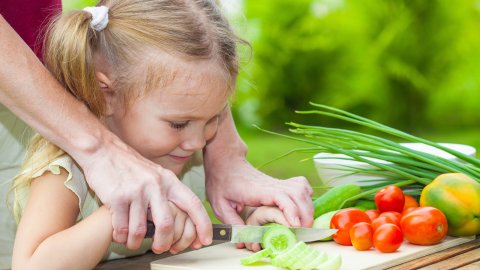Exposure to Healthy Foods in Childhood Leads to Healthy Choices in Adulthood

The kinds of foods you’re exposed to during childhood help dictate your eating habits as you get older, writes Tom Jacobs in his summary of a recent study on Pacific Standard.
The examples set by ones’ parents at the dinner table during childhood could help define the choices we make when we’re standing in the college dining hall line, picking food for ourselves. What’s more, Devina Wadhera, lead author of the study that was published in the journal Appetite, writes:
“Parental encouragement and modeling was positively related to current liking, even for foods that were disliked in childhood. Frequent exposure to foods in childhood could be a simple and effective way for parents and caregivers to instill healthy eating habits in children.”
The study featured 670 students that were presented with 122 foods. Researchers inquired about their history with each one: whether they enjoyed eating it as a kid; did their parents force or encourage them to eat said food; were there any foods that were restricted; and so on. The researchers managed to get 128 of the participants’ parents to fill out a complementary survey to corroborate that their associations with the foods were true. The researchers found:
“The perceived recollection of frequent consumption of foods in childhood was significantly related to current liking for the vast majority of the foods, including nutritious foods such as vegetables. Similarly, parental encouragement and modeling was positively related to current liking, even for foods that were disliked in childhood.”
The opposite effects also held true. Foods that the participants were not exposed to in youth led to them disliking the food as adults. This association was beneficial for certain foods (e.g., Twinkies, donuts, bacon), but bad for healthier foods (e.g., veggies).
Parents who forced their children to consume certain foods, however, left participants with a bad taste of those foods later on in life. Whereas a parent’s constant restriction of a certain food led participants to desire it all the more later on in life.
So parents, bear with your child’s stubborn resistance to Brussels sprouts; your hard work will pay off in the long run. Just by exposing your kid to that food will mean he or she will make better choices later on in life. There will just have to be more coercion involved in order to get them to actually eat it.
Read more at Pacific Standard.
Photo Credit: Shutterstock





